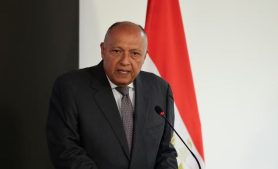President Donald Trump erupted onto the global stage under the isolationist banner “America First” — bent on tearing the multilateral world order down to its foundations.
Now, at the end of his first year in office, the United States and its shell-shocked allies face several escalating crises that could plunge the world into devastating new conflicts.
When Trump came to office in January, his predecessor Barack Obama warned that North Korea’s breakneck dash to develop long-range nuclear missiles was his most pressing threat.
As 2017 comes to an end, that threat has soared dramatically. Last month Kim Jong-Un test fired an ICBM and boasted that his nuclear arsenal can now hit any city on the US mainland.
Trump himself has stirred tensions with reckless language, sneeringly branding Kim “Little Rocket Man” and threatening to visit “fire and fury” on his authoritarian regime.
Alongside the bravado, US diplomats have put together a punishing international sanctions regime designed to force Pyongyang to the table, so far to no avail.
South Korea and Japan, also in North Korea’s firing line, are facing a potentially cataclysmic conflict and China is concerned about chaos erupting on its border.
But, perhaps for the first time it is not the erratic behavior of the North Korea dictator that worries the world, but the unpredictable signals coming from the White House.
He has hit out at Britain’s Prime Minister Theresa May and Germany’s Chancellor Angela Merkel on Twitter, accusing them of being lax in the battle against Islamist extremism.
And, having ditched the TPP trade pact that was meant to bind small east Asian neighbors under US influence to contain China, he is now threatening the NAFTA deal with Canada and Mexico.
Last week, German Foreign Minister Sigmar Gabriel warned that Trump’s abdication of US leadership “is accelerating a change in the world order” and that Europe should look to itself.
And that was before Trump broke with decades of US peacemaking practice and unilaterally recognized the divided and disputed city of Jerusalem as Israel’s capital.
Arab leaders were predictably appalled at what they saw as a reckless snub to the Palestinian cause, but the chorus of condemnation was international and near universal.
Celia Belin, visiting fellow at the Brookings Institution, sees a theme running through Trump’s most isolationist stances: they are gestures to please US electors and donors.
Indeed, in a speech on Monday to launch his first National Security Strategy, Trump declared: “America is coming back and America is coming back strong” a message clearly aimed at his base.
On climate, Iran and Jerusalem he has signed off on a vow given to part of his electoral base, without really committing Washington long-term to anything new, Belin said.
Nevertheless, she told AFP, the very fact that US allies and foes feel forced to react to Trump’s domestic posturing poses risks: “The problem often comes from external overreaction.”






